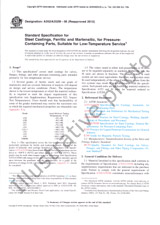We need your consent to use the individual data so that you can see information about your interests, among other things. Click "OK" to give your consent.
ASTM D4060-19
Standard Test Method for Abrasion Resistance of Organic Coatings by the Taber Abraser
Translate name
STANDARD published on 1.10.2019
The information about the standard:
Designation standards: ASTM D4060-19
Note: WITHDRAWN
Publication date standards: 1.10.2019
SKU: NS-973587
The number of pages: 6
Approximate weight : 18 g (0.04 lbs)
Country: American technical standard
Category: Technical standards ASTM
The category - similar standards:
Annotation of standard text ASTM D4060-19 :
Keywords:
abrasion resistance, wear index, Taber Abraser tester,, ICS Number Code 25.220.60 (Organic coatings)
Additional information
| Significance and Use | ||||||||||||||||
|
5.1 Coating on substrates can be damaged by abrasion during its service life. This test method has been useful in evaluating the abrasion resistance of coatings. Ratings produced by this test method have correlated well with ratings produced by the falling abrasive values in Test Method D968. 5.2 For some materials, abrasion tests utilizing the Taber Abraser may be subject to variation due to changes in the abrasive characteristics of the wheel during testing. Depending on abradant type and test specimen, the wheel surface may change (that is, become clogged) due to the adhesion of debris generated during the test and must be resurfaced at more frequent intervals as agreed upon by the interested parties. To determine if more frequent resurfacing is required, plot the total weight loss every 50 cycles. If a significant negative change in slope is observed prior to 500 cycles, the point at which the slope changes determines the resurfacing frequency. 5.3 When evaluating resistance to abrasion of two or more coatings, other factors may need to be considered for an accurate comparison. Flexible coatings that include air entrainment bubbles could alter the mass loss during comparison tests. Coatings that include dense fillers may result in greater mass loss but have less change in coating thickness. Coatings that include silica, metal oxides or other extremely dense particulates, may wear the abrasive wheel. Wear debris that includes extremely dense particulates may cause three-body abrasion that contributes to the break-down of the coating if not removed by the vacuum suction system. Coatings that have a hardness value or coefficient of friction greater than the abrasive wheel may cause the abrasive wheel to break down faster. Coatings that have different coefficient of friction ratings, must be taken into consideration during comparison tests. Examples of coatings that may be impacted include, but are not limited to; epoxies, polymethyl-methacrylate (PMMA), polyurethane-methacrylate (PUMA), methyl-methacrylate (MMA), and carbon resin. Note 1: 1.1 This test method covers the
determination of the resistance of organic coatings to abrasion
produced by the Taber Abraser on coatings applied to a plane, rigid
surface, such as a metal panel.
1.2 The values stated in SI units are to be regarded as the standard, with the exception of mils when determining coating thickness. 1.3 This standard is similar in content (but not technically equivalent) to ISO 7784–2. 1.4 This standard does not purport to address all of the safety concerns, if any, associated with its use. It is the responsibility of the user of this standard to establish appropriate safety, health, and environmental practices and determine the applicability of regulatory limitations prior to use. 1.5 This international standard was developed in accordance with internationally recognized principles on standardization established in the Decision on Principles for the Development of International Standards, Guides and Recommendations issued by the World Trade Organization Technical Barriers to Trade (TBT) Committee. |
||||||||||||||||
| 2. Referenced Documents | ||||||||||||||||
|
We recommend:
Technical standards updating
Do you want to make sure you use only the valid technical standards?
We can offer you a solution which will provide you a monthly overview concerning the updating of standards which you use.
Would you like to know more? Look at this page.




 Cookies
Cookies
